|
|
|
Sort Order |
|
|
|
Items / Page
|
|
|
|
|
|
|
| Srl | Item |
| 1 |
ID:
148851


|
|
|
|
|
| Summary/Abstract |
Ananda Kentish Coomaraswamy (1877-1947) was a profound thinker
and prolific writer of the early twentieth century. By the end of his life,
Coomaraswamy was thoroughly versed in the scriptures, mythology,
doctrines and arts of many different cultures and traditions. He was an
astonishingly erudite scholar, a recondite thinker and a distinguished
linguist. He left an intellectual legacy that enriched a variety of
disciplines like geological studies, history and theory of art, linguistics
and philology, social theory, psychology, mythology, folklore, religion
and metaphysics. An arch critic of modernism, Coomaraswamy was a
versatile genius and a seminal influence.
|
|
|
|
|
|
|
|
|
|
|
|
|
|
|
|
| 2 |
ID:
148849
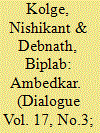

|
|
|
|
|
| Summary/Abstract |
Despite several decades of marginalization by India’s political and
intellectual elite, Dr. B. R. Ambedkar (1891-1956) occupies a major
position in the pantheon of Indian thinkers. In the present political and
academic discourses, Ambedkar and his legacy have acquired a greater
presence than ever before.
|
|
|
|
|
|
|
|
|
|
|
|
|
|
|
|
| 3 |
ID:
148847


|
|
|
|
|
| Summary/Abstract |
This paper is being written against the backdrop of the traumatic
incident of Rohith Vemula’s suicide (17 January 2016)1
that has unleashed
in the media, on the one hand, a national debate on the implications of
being a Dalit in India at present, whereas, on the other, it has blazed a
trail of mutually competing, contesting, converging, condemnatory and
opportunistic views and voices sometimes marked by either grotesque
display of political correctness and sheer opportunism ranging from
revising the ogre of the caste-system and its inner contradictions,
“instant vilification” of almost all Hindus, Hinduism and the ruling party
of the day, the BJP, for all the ills and evils emanating from the castesystem,
conduct of the political establishment and the brazen
politicization of the Rohith-suicide case etc.
|
|
|
|
|
|
|
|
|
|
|
|
|
|
|
|
| 4 |
ID:
148846


|
|
|
|
|
| Summary/Abstract |
Neither Mr. Tilak nor his speeches really require any presentation or
foreword. His speeches are, like the featureless Brahman, self-luminous,
straightforward, lucid, never turning aside from the point which they
mean to hammer in or wrapping it up in ornamental verbiage, they read
like a series of self-evident propositions. And Mr. Tilak himself, his
career, his place in Indian politics are also a self-evident proposition, a
hard fact baffling and dismaying in the last degree to those to whom
his name has been anathema and his increasing pre-eminence figured
as a portent of evil.
|
|
|
|
|
|
|
|
|
|
|
|
|
|
|
|
| 5 |
ID:
148843


|
|
|
|
|
| Summary/Abstract |
On January 23rd this writer was invited to speak at the All India Bank
Employees Association (AIBEA) annual meeting, led by the Punjab
National Bank, on The Future of Democracy in India. The theme seemed
a little incongruous for an occasion where, “Comrades of the World
Unite,” to discuss their welfare. In fact, I wonder if bankers ever have
the time to think or worry about democracy. Judging by the mechanical
manner in which the customers who enter the banks are greeted it
would seem that democracy is an outlandish concept.
|
|
|
|
|
|
|
|
|
|
|
|
|
|
|
|
| 6 |
ID:
148848
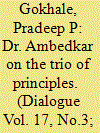

|
|
|
| 7 |
ID:
148844
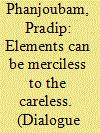

|
|
|
|
|
| Summary/Abstract |
Six unnatural deaths, 70 injured on a single day is by all means a tragedy.
The casualty figure in the January 4 earthquake has risen to seven with
the death of one more in a school building collapse on January 6. This
sense of tragedy is despite the desensitisation to violent deaths that
insurgency torn places like Manipur has undergone. But the fact is, if
at all this is a consolation, the casualty figure could have been much
worse.
|
|
|
|
|
|
|
|
|
|
|
|
|
|
|
|
| 8 |
ID:
148857
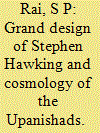

|
|
|
|
|
| Summary/Abstract |
Chapters I and II appeared in the previous Volume (17:1) of Dialogue.
Chapter I discussed the philosophy of Cosmology and various related
questions raised in the introductory para of Stephen Hawking's book
Grand Design. Chapter II briefly summarised Stephen Hawking's
concept of cosmology in the Grand Design.
|
|
|
|
|
|
|
|
|
|
|
|
|
|
|
|
| 9 |
ID:
148854


|
|
|
|
|
| Summary/Abstract |
Idealism has been a popular movement both in the East and in the
West. The nineteenth century western Philosophy, largely dominated
by idealism, was in a complacent ascendancy in Britain, Germany and
America even at the turn of the Century. Indian soil has particularly
been fertile for idealistic growth, and it is only a truism to say that
contemporary Indian thinking is out and out idealistic in its temperament.
However, it is not proper to say that the contemporary Indian
philosophising is a mere revival of ancient speculation. The cultural
contact India had with the west through British rule and introduction
of English education made it possible for Indian thinkers to forge ahead
of mere revival of the ancient views and endeavour for reinterpretation
and adding new ideas based on the climate of cultural assimilation.
Some of the Indian thinkers tried to develop a synthetic philosophy on
the structural base of idealism.
|
|
|
|
|
|
|
|
|
|
|
|
|
|
|
|
| 10 |
ID:
148852
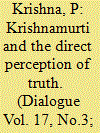

|
|
|
|
|
| Summary/Abstract |
Krishnamurti was one of the most original thinkers of our time, who
investigated fundamental questions about the purpose of life, the true
meaning of love, religion, time, and death without seeking answers in
any books or scriptures and without accepting any belief, organized
religion or system of thought. Like the Buddha, he sought the answers
to these questions through observation, inquiry and self-knowledge
and arrived at a direct perception of truth which lies beyond intellectual
concepts, theories and descriptions.
|
|
|
|
|
|
|
|
|
|
|
|
|
|
|
|
| 11 |
ID:
148853


|
|
|
|
|
| Summary/Abstract |
The other day I met an American friend of mine, a professor of philosophy.
He is an ardent Buddhist and has studied Krishnamurti (K) very well. I
asked him, “have you any courses on K.” With hesitation he accepted
that he has not been able to do it. However, he refers to him while
teaching the Buddhist texts. He finds it difficult to fix K in a system and
frame him in any category.
|
|
|
|
|
|
|
|
|
|
|
|
|
|
|
|
| 12 |
ID:
148855


|
|
|
|
|
| Summary/Abstract |
Professor Ramchandra Dattatraya Ranade is a mystical idealistic
philosopher with saintly temperament. His philosophy is deeply
influenced by Upanisadic and Vedantic thought. He had given primacy
to immediate intuitive experience (aproksanubhuti) over reason (tarka
buddhih) for realization of truth. He was born in Jamkhandi on July 3rd
1886 and he left for heavenly abode on June 6th 1957 at Nimbal in
Bijapur district. He has done his graduation from Deccan College and
post-graduation from Bombay University.
|
|
|
|
|
|
|
|
|
|
|
|
|
|
|
|
| 13 |
ID:
148845
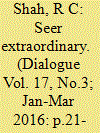

|
|
|
|
|
| Summary/Abstract |
The information available about Nisargadutt Maharaj is inadequate. He
was born in 1897 in a poor Brahmin family. His father Shiv Ram Pant
was a farmer at Kandolgaon – a small village in Ratnagiri district of
Maharashtra. As he himself tells us in his conversations, “My destiny
was to be born a simple commoner, with little formal education.” The
reader is advised to read a book which is a spiritual classic called ‘I am
That: Talks with Sri Nisargadutt Maharaj” – translated from the Marathi
tape-recordings by Maurice Frydman; revised and edited by Sudhakar
Dikshit. To quote the editor himself,”
|
|
|
|
|
|
|
|
|
|
|
|
|
|
|
|
| 14 |
ID:
148856


|
|
|
|
|
| Summary/Abstract |
I begin by bowing my head to the wisdom and memory of Vasudevsharan
Agrawal. Years ago, when I was struggling to understand the signs and
symbols of Indic civilization strewn around me and staring at my face
to respond to them, when I was finding myself in the darkness of
ignorance about ourselves, there were only very few writers, artists
and thinkers who illuminated my way. Vasudevsharanji along with my
teachers Mani Kaul, Nirmal Verma, J. Swaminathan and Dharampalji
were among them. It was fortunate for someone living in modern India
with stupid and therefore arrogant political leadership guiding the
country to an ever deeper level of catastrophe with each passing day,
to have found the text of writers like Vasudevsharanji which can, if we
so want, take us out of the mess this country is turning into almost
unstoppably.
|
|
|
|
|
|
|
|
|
|
|
|
|
|
|
|
| 15 |
ID:
148850


|
|
|
|
|
| Summary/Abstract |
Vinayak Damodar Savarkar, commonly known as Swatantryaveer
Savarkar was a freedom fighter, social reformer, rationalist, writer,
dramatist, poet, historian, political leader and philosopher. Savarkar
has expressed and penned his thoughts on a wide range of issues.
These include but are not limited to patriotism, armed revolution,
political science, ethics of non-violence, religion and scriptures,
rituals, untouchability and caste, social reform, mechanization,
defence matters, foreign affairs and economic policy, education,
reform of language and script, prison reforms, role of woman, Sanskrit
and Yoga. Even seemingly minor issues such as festivals, exercise
and oratory do not escape his notice.
|
|
|
|
|
|
|
|
|
|
|
|
|
|
|
|
|
|
|
|
|